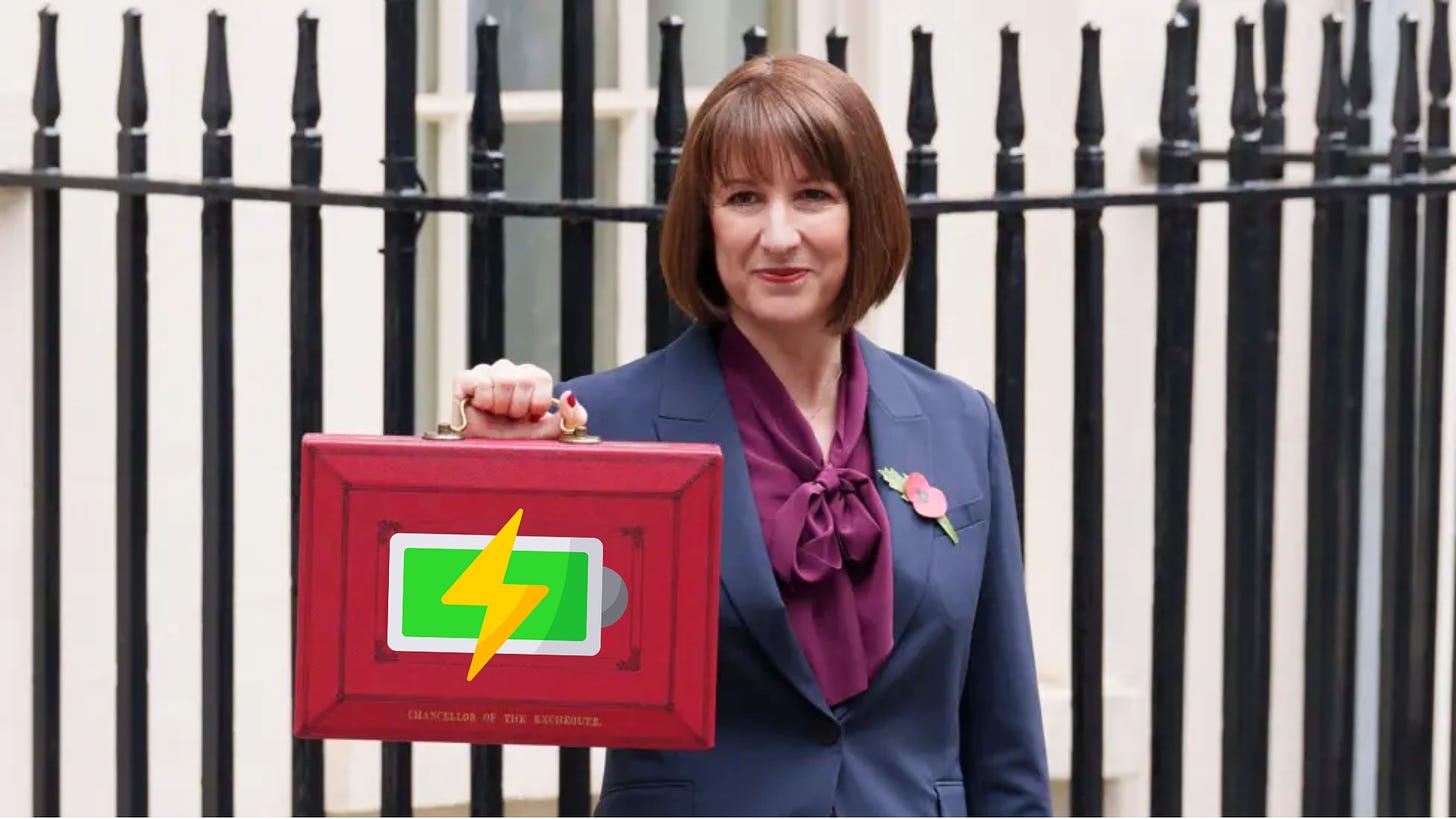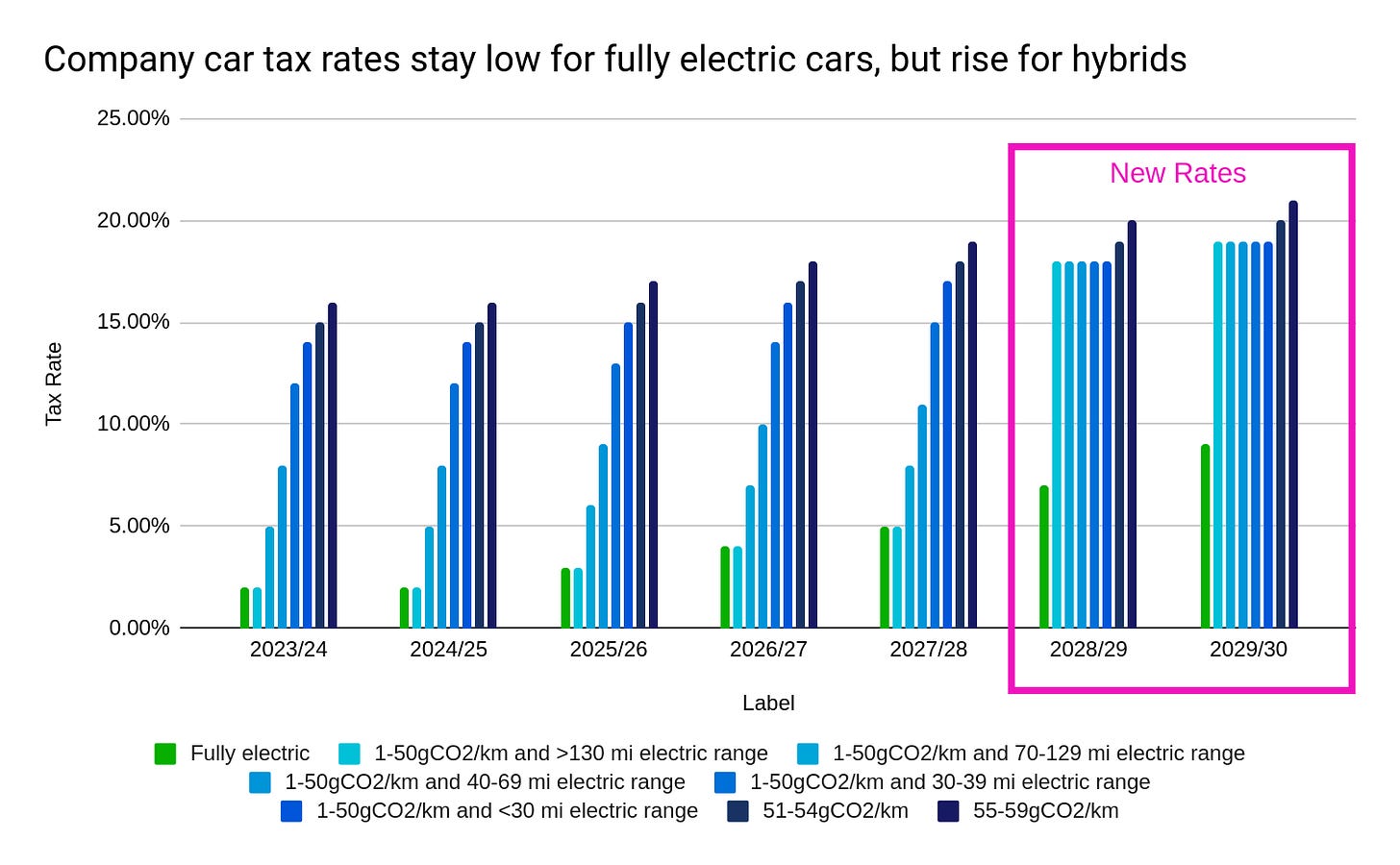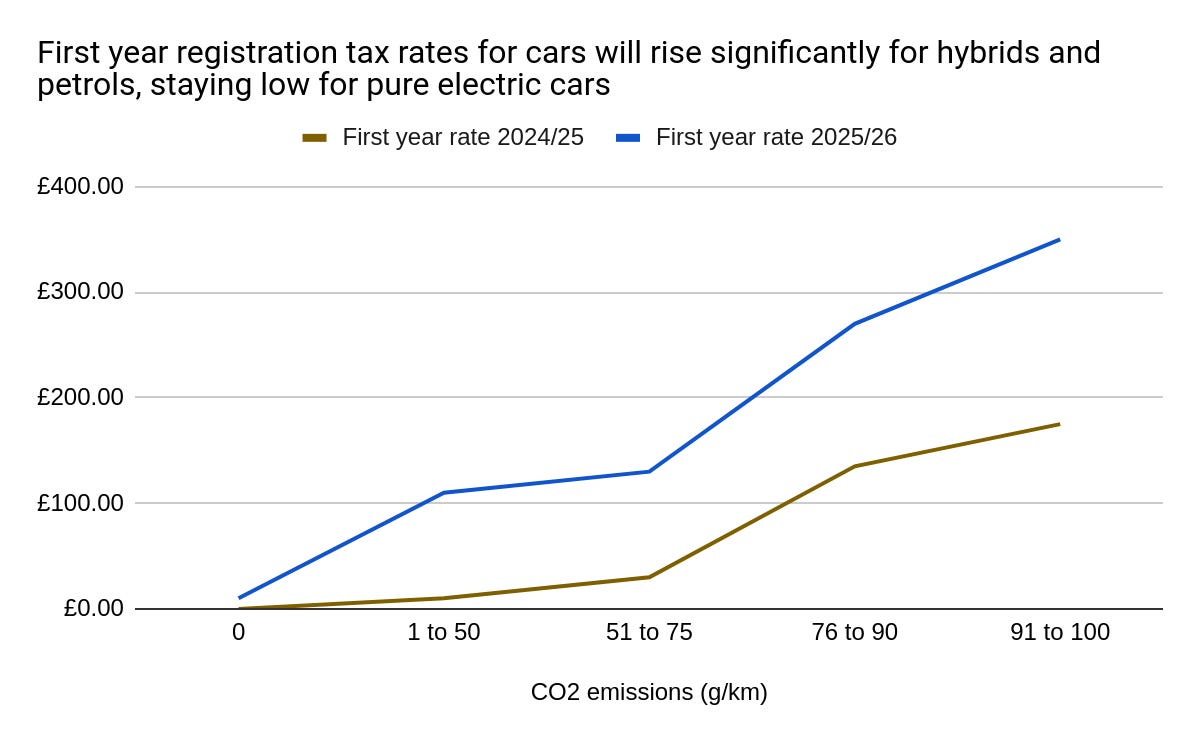Electric Rides for Cooler Days: Britain's 'all-electric' Chancellor - UK budget special
Welcome to our monthly newsletter with a round up of the latest from New AutoMotive in October 2024
Welcome to the October edition of our newsletter, bringing you the latest updates from New AutoMotive covering our work and the transition to clean road transport.
You’re receiving this because you signed up to receive updates from us. Changed your mind? Not a problem, you can change your preferences or opt out of emails here.
In this edition
UK sees biggest month for EV sales on record, our latest roundup of global EV sales, and reflections on UK party conference season - all in Latest News
In-depth budget analysis special - scroll down to Corridors of Power
Are diesel sales back from the dead?; Calls for watering down EU CO2 standards - scroll down to Back to the Future
We’re glad you’re here - we’d love to know a bit more about what you’d like to hear about in this newsletter. If you have a minute, why not take our reader survey!
Breaking news… champagne corks were popping in the New AutoMotive office (or, more accurately, champagne emojis were being posted on New AutoMotive slack channels) as UK Chancellor Rachel Reeves confirmed her agreement with New AutoMotive’s calls to reform VED to better support the transition to EVs. Scroll down to “Corridors of Power” for more detail.
UK Car Sales: We published our latest UK market bulletin at the start of the month, covering vehicle registrations in September. Traditionally a big month for car sales, September’s EV sales would set the tone as we head towards the end of the year. It was great to see such strong sales of electric cars - more were sold in September 24 than in any month on record in the UK. You can read the full bulletin here.
Global EV sales latest: Our latest global EV tracker found that BEV car sales continued to grow, with the US overtaking the EU in a quarter for the first time. Elsewhere, sales either grew or stagnated ahead of next year’s increase in emissions standards and EV sales targets in several key markets including the EU. Read the bulletin below, or catch up on the webinar, above.
UK Party Conference Season: October saw the UK’s main political parties hold their conferences. The Liberal Democrats celebrated their recent election results which saw record MPs elected in recent times. The Conservatives pondered their next leadership and the party’s future following their exit from government in July. At the Labour Party conference, the mood was mixed as the party grappled with its return to government after 14 years in opposition. Our CEO Ben Nelmes reflected on the mood in Liverpool.
New AutoMotive in the News
Global EV Tracker’s finding that US electric car sales have outpaced those in the EU was picked up in several US outlets, including National Sustainability News, InsideEVs, Electric Cars Report, as well as AM Online, Motor Finance Online,
Our report with recommendations about EVs and taxation was picked up in several outlets. We were pleased that the coverage prompted confirmation from the UK government that it did not have plans to introduce road pricing. You can read about it in GB News, the Daily Mail, the Express, Birmingham Mail, CITTI Magazine, Transport & Energy, Regit, and more.
Our take on car sales was presented as an alternative to the some other interesting views on September’s new car sales figures was picked up by Rob Hull in this article in the Daily Mail, which looked at a row between new pro-EV campaign group EVUK and the motor industry trade body, the SMMT. There was more coverage of our monthly sales figures and ZEV mandate analysis in Car Dealer Magazine, Transport & Energy, Business Telegraph, Mobility Portal EU,
Analysis from our monthly car market bulletin was also included in the Daily Mail’s coverage of carmakers’ efforts to secure additional subsidies for car sales in the forthcoming Budget. We were pleased that The Guardian’s Jasper Jolly covered our take on the carmakers’ calls.
An interview with our CEO and Automotive World covering car finance and electric vehicles was published in October with discussion of how electrification is impacting the motor finance market.
UK BUDGET SPECIAL: Chancellor reforms road tax • Fuel duty frozen • £2bn for automotive industry transition • Extension of fiscal incentives for electric cars & vans
The UK’s Chancellor Rachel Reeves launched a bumper set of measures that are set to boost electric car uptake in the new Labour government’s first budget. Electric vehicles got a whole paragraph in the Chancellor’s speech:
We want to support the take-up of electric vehicles, so I will maintain the incentives for electric vehicles in company car tax from 2028 and increase the differential between fully electric and other vehicles in the first-year rates of vehicle excise duty from April 2025. These measures will raise around £400 million by the end of the forecast period.
On the automotive manufacturing transition, she confirmed:
…£2 billion for the automotive sector to support our electric vehicle industry and develop our manufacturing base, building on our strengths in the north-east and the west midlands…
We’ve delved into the details of what she announced. Here’s our analysis.
The “All-Electric” Chancellor
Rachel Reeves is clearly no fan of hybrids. In her reforms to road tax and company car tax rates she clobbered hybrids in favour of fully electric cars. On company car tax (which are the income tax rates charged on the value of cars provided through salary sacrifice or company car arrangements), the Chancellor announced new rates for 2028/29 and 2029/30, keeping rates very low for electric cars, but hiking the rates charged on even the most efficient hybrids.
Similarly, in her changes to road tax (Vehicle Excise Duty), she clobbered the amount that purchasers of hybrid cars will pay in the first year of the vehicle’s life. These vehicles will go from paying no road tax in 2024/25 to £110 from April 2025, while fully electric cars will pay a rate that will remain fixed at £10 between now and 2030.
Finally, the Chancellor opened the door to the potential to use the road tax system to further support electric cars. The red book promised to revisit a proposal to exempt electric cars from the expensive car supplement, which is an charge of £410/year paid on cars with a sticker price of more than £40,000 and paid in each of the first three years of the car’s life. This rate, payable on purchases of electric cars from April 2025, could disproportionately hit EVs. Alternatively, it could help promote sticker price reductions as manufacturers seek to get their models in just under the threshold at which the charge applies.
Soaking the gas guzzlers
The average new petrol car sold in 2024 emits 141.3gCO2/km and currently pays a first year rate of road tax set at £270. From April 2025 that will double to £540. But for gas guzzlers and polluting SUVs, the change will be even more dramatic. A motorist purchasing a new 4x4 with an emissions rating of 240gCO2/km will see their first year rate of road tax go from £2,340 to £4,680. It is worth noting that these first year rates morph into a the standard rate of road tax after the first year of the vehicle’s life, which in 2025/26 will be £195, representing a modest £5 increase from £190 in the current tax year.
Supporting businesses to decarbonise their fleets
There were a range of measures to help businesses that own vehicles decarbonise. First, welcome confirmation of the continuation of the plug-in van grant, which is essential to supporting a nascent market for electric vans. But there was more. Full expensing for purchases for zero emissions vehicles and charging infrastructure was continued for another tax year at a cost to the exchequer of £175m in 2025/26 and £125 in 2026/27.
Cash for gigafactories
Amid a swathe of announcements about investment programmes, the Chancellor set aside £2bn for the automotive industry transition. While we await to see the details of how much is new money, it is a lot of money for the UK’s export-oriented car industry.
Rise in fuel scrutiny, not duty
Fuel duty remains frozen and the temporary 5p reduction introduced by esrtwhile Chancellor Rishi Sunak in March 2022 remains in place, looking ever more permanent. But it’s not all plain sailing for fuel retailers, who will faced increased pressure from the Competition and Markets Authority which, from January 2025, will have additional powers to ensure competition is passing on the tax reduction to consumers rather than being absorbed into the margins of oil companies. Similarly, fuel retailers will have to publish data on fuel prices and volumes available.
Our pick of the best automotive industry stories
Back from the dead? The strange case of September’s diesel car sales
“Private demand for new diesel cars growing faster than for EVs”, read a headline in a piece by the Press Association’s transport editor Neil Lancefield covering the publication of September’s new car registration data by the Society of Motor Manufacturers and Traders (SMMT). The article, syndicated in news outlets across the UK and beyond, was met with confusion and concern by car market watchers. The UK government’s Director of Transport Decarbonisation mused in a LinkedIn post that some ‘interesting reporting’ of September’s car sales had ignored the fact that September was easily the best month for EV sales in UK history.
The SMMT clearly felt the need to distance themselves from the reporting, and pointed the finger at Lancefield, stating on twitter that their “data was used incorrectly after we stated that private buyer demand for diesel outstripped EVs in September” (emphasis added). Indeed, the first version of Lancefield’s article which was circulated under embargo, made no mention of the kind of demand at all.
But is it as simple as that? The SMMT’s press release stated that “consumer demand for diesel” had grown, despite the fact that on all measures diesel sales were down in September. This is at best unclear. After all, businesses are consumers of products just as much as private individuals. Indeed, the categorisation of car sales into ‘company’ and ‘private’ is just as unclear, since company sales can include cars leased by private individuals, obtained by private individuals through salary sacrifice schemes, and some Motability vehicles. Perhaps it would be better if all parties abandoned this data point in analysing the car market in the future.
BMW joins chorus of automotive industry voices putting pressure on EU CO2 regulations
Oliver Zipse, BMW’s CEO, has become the latest senior figure in the European automotive industry to put pressure on Brussels to water down EU rules requiring the sale of cleaner cars. “The mood in Europe is trending towards pessimism,” he is reported to have said. Instead of the EU’s current approach of requiring reductions in per-kilometer emissions of CO2 at the tailpipe, Zipse wants to see a “technology agnostic” approach. The same arguments were deployed in a recent European Parliament debate on the crisis in the automotive industry. Perhaps Zipse should heed the advice of Swedish social democrat Johan Danielsson MEP who offered the following advice: “relaxing environmental standards today is like peeing in the winter to keep warm. It’s warm at first, but then it gets oh so cold.”
Have a great November!
Team New AutoMotive
Got an idea for something we should include in the future? Send it over to general@newautomotive.org - we’d love to hear from you!
You’re receiving this because you signed up to receive updates from us. Changed your mind? Not a problem, you can change your preferences or opt out of emails here.












